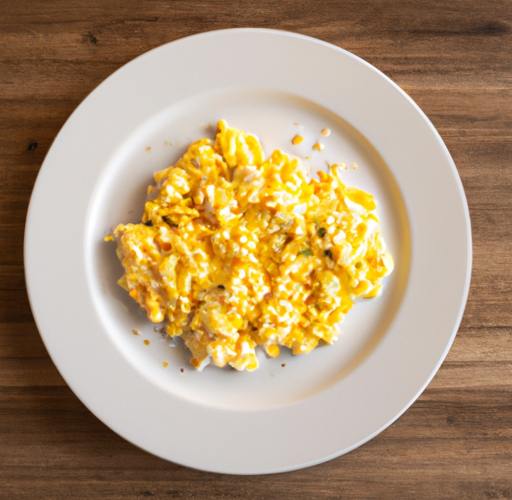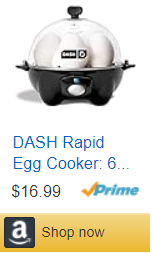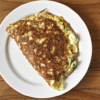Guten Tag! Today, we’ll be bringing a touch of Germany to your breakfast table with these delicious German scrambled eggs. Also known as “Rühreier,” this simple yet delightful dish can be served on its own or as a side to complement any breakfast. So let’s get cracking and whip up this traditional German breakfast staple! We’ve made this german scrambled eggs recipe easy to follow 👨🍳.
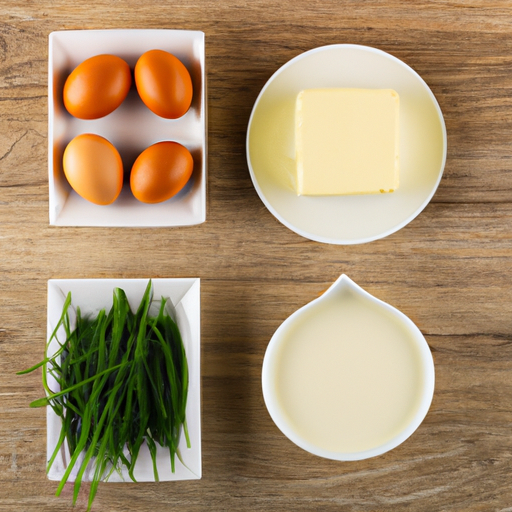
Ingredients
- 4 eggs
- 1/4 cup milk
- 1/4 tsp salt
- 1/8 tsp black pepper
- 2 tbsp butter
- 2 tbsp chopped fresh chives
Instructions
- Crack open 4 eggs into a medium-sized bowl. Add in 1/4 cup milk, 1/4 tsp salt, and 1/8 tsp black pepper, then beat everything together with a fork until the mixture is smooth and combined.
- Place a large non-stick skillet over medium heat on your stove. Add 2 tbsp of butter into the skillet and allow it to melt completely and coat the bottom of the pan.
- Once the butter has melted, pour the egg mixture into the skillet and stir everything together occasionally with a rubber spatula. Cook this mixture until the eggs begin to set around the edges and on the bottom of the pan, but remain moist in other areas. This should take around 4-5 minutes.
- Add in 2 tbsp of freshly chopped chives to the skillet using the rubber spatula to stir everything together until well combined.
- Turn off the heat and remove the skillet from the stove top. Allow the eggs to rest for about 1-2 minutes so that any remaining liquid can set.
- Finally, serve the scrambled eggs while they are still hot with some buttered toast or crusty bread, and enjoy your delicious German-style scrambled eggs!
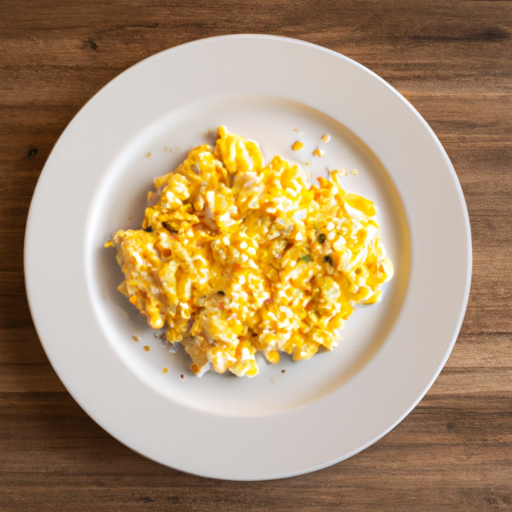
How long does german scrambled eggs last in the fridge?
German scrambled eggs, like any other cooked food, can be stored in the fridge for up to 4 days if properly stored in an airtight container. It is important to let the eggs cool down to room temperature before placing them in the fridge to prevent condensation from forming in the container and causing spoilage. When reheating, it is recommended to use a microwave or a stovetop and to make sure the eggs are thoroughly heated throughout to eliminate any potential bacteria growth. It is not advisable to freeze scrambled eggs, as they can become watery and lose their texture when thawed. As with any food, it is important to use your best judgment and trust your senses when determining whether the eggs are still safe to eat.
Low calorie german scrambled eggs recipe substitutions
To make this recipe lower in calories, there are a few substitutions that can be made. Firstly, instead of using 4 whole eggs, you can use 2 whole eggs and 2 egg whites. This will reduce the overall calorie and fat content, while still maintaining the protein content. Additionally, you can replace the butter with a non-stick cooking spray or a small amount of olive or canola oil. Finally, you can reduce the amount of chives used or replace them with other low-calorie herbs like parsley or cilantro. These substitutions can make the recipe healthier and lower in calories without compromising taste.
What to serve with a german scrambled eggs?
German scrambled eggs, also known as “Rühreier,” are usually served for breakfast or brunch and are a popular dish in Germany. They are typically made with eggs, milk, and seasoning. To complement the flavors of the eggs, you can serve them with a variety of sides. Traditional German sides to serve with Rühreier include sliced tomatoes, fried potatoes, crispy bacon, and toast. For a healthier option, you could also serve the eggs with a fresh fruit salad or a side of greens, such as arugula or spinach. Additionally, adding a dollop of sour cream or some grated cheese on top of the scrambled eggs can enhance their richness and creaminess.
Whats the best sauce for a german scrambled eggs?
German scrambled eggs, also known as “Rühreier,” are a simple and delicious way to start the day. The best sauce to accompany them is a classic hollandaise sauce. Hollandaise sauce is a rich and creamy sauce made with egg yolks, butter, and lemon juice. The tanginess of the hollandaise sauce perfectly complements the richness of the scrambled eggs, creating a flavor explosion in every bite. To make hollandaise sauce, combine egg yolks and lemon juice in a mixing bowl, then whisk in melted butter until the sauce is thick and creamy. Serve the sauce alongside the scrambled eggs for a decadent breakfast that everyone will love.
German scrambled eggs health benefits
German scrambled eggs, also known as “Rührei”, are a delicious and satisfying breakfast dish. While they are not necessarily a superfood, eggs themselves are a good source of protein, vitamin B12, and healthy fats. However, if you’re looking for a recipe with more health benefits, consider making a veggie-filled omelette with spinach, mushrooms, and tomatoes for added vitamins and minerals. Alternatively, a tofu scramble with turmeric and avocado provides a plant-based protein-rich option.
Post | Title | Ratings | Link |
 | Turkey and Cheese Omelette | ||
 | Goat Cheese and Tomato Omelette | ||
 | Tomato and Mozzarella Omelette |

